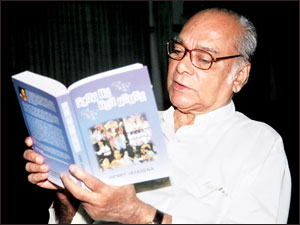Focus on BooksJayasena
and Socrates: a memoir
Professor Sunanda MAHENDRA
It must be around the last part of 1980s. I was assigned by the
Director General of National Youth Services Council (NYSC) to launch and
implement a theatre course. Having drafted a syllabus, I was in need of
trained theatre teachers which was always a scarcity in the country.
Several seasoned people came into my mind. Sugathapala de Silva,
Professor Ediriweera Sarachchandra and Henry Jayasena were in the
priority list. I contacted them and they were agreeable. Henry wanted to
hold several theatre workshops, which he felt was a realistic need to
build a better theatre culture.
|

Dr. Henry Jayasena with his book ‘Play is the Thing’.
Picture by Palitha Gunasena |
Most theatre teachers, I have observed over the years, give more
emphasis on physical training over and above the mental training and
speech modulations. But Henry's technique was somewhat different. He was
a much relaxed person who while accepting the needs of the actor
training and director training laid emphasis on a relaxed mood of
concentration, where the various types of movements, improvisations,
delivery of words or verbal communication, tracking, grouping and mini
dance forms were shown as the significant features. He would get the
trainers who so gathered in the classroom to create 'live' situations.
and interpret what they mean in terms of theatre. In this direction he
was an amalgamation of the actor cum director training. Some of those
who taught theatre were of a different calibre.
He also emphasized on the need to 'create' charming or attractive (he
used the term vichitra) sequences. He compared them to those paintings
on pictures. He believed that the director is ultimately responsible for
this attraction, it is the actor's concern to know what the director
wants to create in terms of situations on the stage.
I have participated in this kind of theatrical activity while my
short stay in Poland attached to Grotowski theatre group. That was the
basic technique in the 'free theatre' where the maximum skills of a
performer is anticipated by a director. That was not too strenuous and
tired.
Henry employed a teaching technique which meant practical terms
instead of dogmas, that were adhered to by other teachers. In this
manner he was above board. Then came the question time where the theatre
students were requested to ask any question relevant to the subject.
"Sir, what is meant by alienation effect of Brecht, which is usually
pronounced by theatre teachers?" Asked one of the students.
"You should not be worried too much on that technique." He said.
"It is a factor that emerges from the ritual. If you study the
aspects of the ritual which most of us are familiar, there is this so
called alienation or 'v' effect. Then he went on exemplifying the
various segments in the ritual and linked it to the theatre, with
examples.
"This is nothing but distancing the actor or the performed in order
to protect the audience from sensitizing or sentimentalizing via the
actions and expressions. Then lively discussion ensues. Henry seems
indefatigable. During the lunchtime Henry once asked me as to what I am
engaged in the literary and practical theatrical field. At this time I
had a play script written having my experience in Grotowski Theatre
Foundation. I selected the life and times of Socrates as my source
material. Before launching the rehearsals, I wanted to get the
manuscript published through the National Library Services Board. I had
several prior publications founded via this project. The government
officers normally send the manuscripts to a person to submit a scrutiny
report. The acceptability was not a problem for me. I was sure that
somebody who reads it would approve for publication.
So I replied:
"I am trying to produce a play based on the life and times of
Socrates. I have found quite a lot of interesting source material."
For a moment Henry looked at me. He brooded on and said.
"You are talking of producing a play on Socrates. And I read a very
interesting play called 'Socrates' a few days ago. Don't know who had
written, but I am pretty sure it's the type that should be produced."
I did not want to divulge my secret.
"How did you get the script?" I asked Henry.
"Why, this National Library Services Board normally sends me play
scripts from time to time. Honestly I have never read an interesting
play script like this."
Once again I felt like revealing the secret. But I never did it,
until the play was staged and Henry was invited to grace the occasion.
Apparently Henry was amazed after seeing my play.
"Why didn't you say that you wrote the script?"
I had nothing to say.
"I thought it's good to keep silent at that moment." I said later on.
Then another instance I was requested by my friend Lucien
Bulathsinhala to talk a few words about play script Pinavi Maluwo, a
play which he wanted to stage later on. Henry was also asked to speak a
few words at the same launching ceremony. I was the first speaker and I
dealt on the complexity of the play, and I quoted several dialogues in
the text. When the chance came for Henry to address the audience, he
just pointed a finger and smilingly said:
"This fellow has not left anything for me to talk."
Henry Jayasena was bestowed with a DLitt for his creative activities
and this holds ample testimony for his achievements over the years. He
was a versatile highly skilled bilingual creative artiste who stood
unshaken by some of the tremendously turbulent struggles. At a time when
nincompoops obtain doctorates from mushroom academies. Henry deserved
it, as a fully accomplished reward.
[email protected]
|



